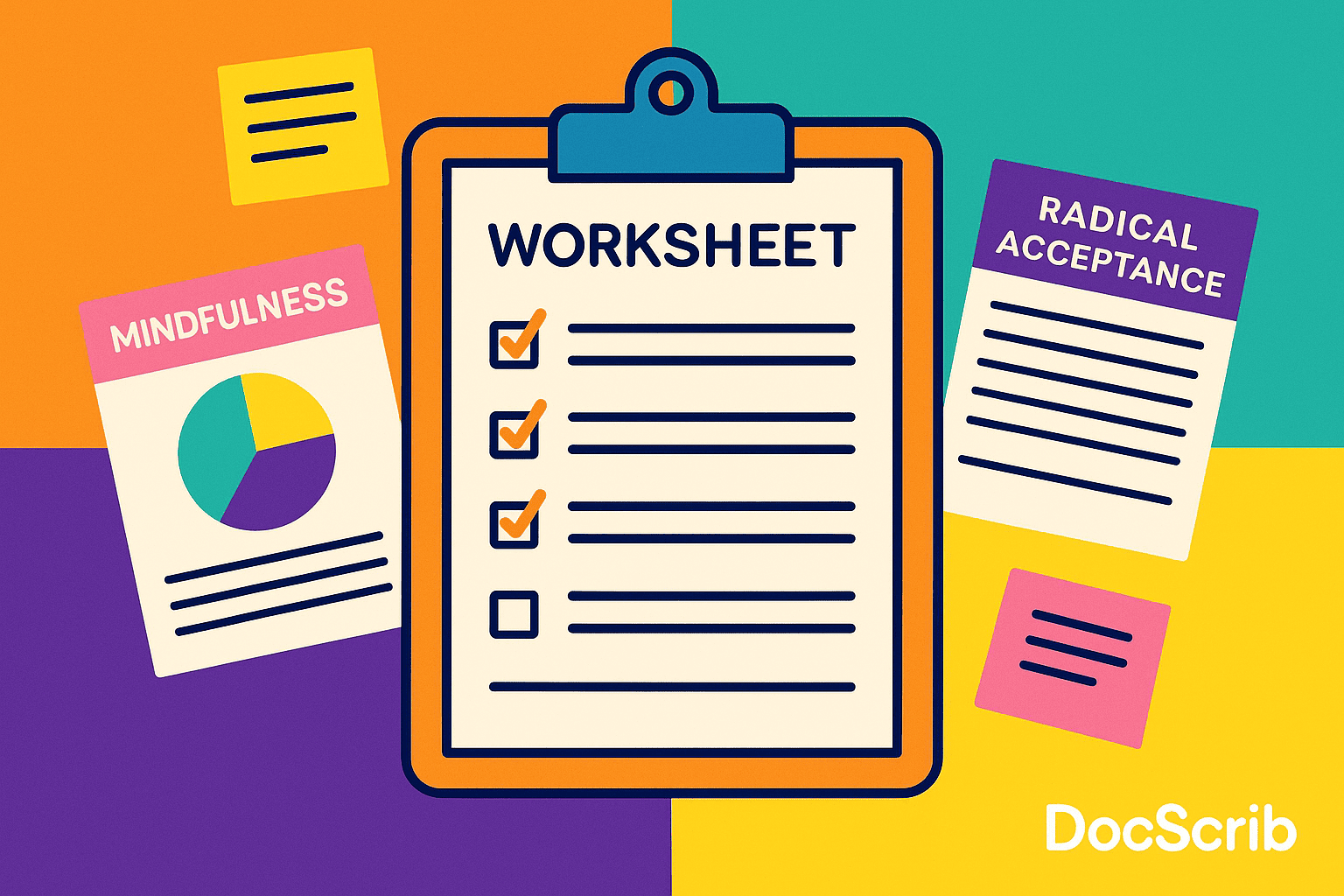Updated on: July 25, 2025
Introduction
Dialectical Behavior Therapy offers a structured system of worksheets rooted in four key skill domains used worldwide in mental health care This article explores various DBT worksheets therapists use to build client strengths in mindfulness emotion regulation distress tolerance and interpersonal effectiveness
Understanding DBT and Worksheet Use
DBT is an evidence‑based psychotherapy that emerged to help individuals with emotional dysregulation suicidal ideation and self‑harm behaviors It integrates acceptance and change strategies deeply influenced by mindfulness All major DBT interventions can be delivered through targeted worksheets that clients can fill during session or as homework
Core DBT Skill Domains and Common Worksheets
Mindfulness Skill Worksheets
These worksheets help clients practice present‑moment awareness without judgment Tasks might include describing internal experience observing thoughts nonjudgmentally and participating fully in activities Common tasks include mindful breathing body scans and noting sensations
Distress Tolerance Worksheets
Used in moments of high emotional intensity these worksheets guide clients through skills like radical acceptance allowing the mind half smiling willingness and self‑soothing They help the client move from resistance to acceptance and reduce suffering
Emotion Regulation Worksheets
These include worksheets for skills such as checking the facts acting opposite paying attention to positives and managing vulnerability They guide clients through cognitive strategies that reduce emotional intensity
Interpersonal Effectiveness Worksheets
These teach assertiveness and communication frameworks such as the DEAR MAN acronym designed to help clients ask for needs set boundaries negotiate and maintain relationships effectively
Overview of Popular DBT Worksheets
Radical Acceptance Worksheet
This helps clients accept reality when resisting it causes distress Outlined steps help them notice rejecting thoughts develop acceptance statements and shift internal resistance into nonjudgmental acknowledgment
IMPROVE the Moment Worksheet
This distress tolerance tool uses the acronym IMPROVE meaning imagery meaning prayer relax one thing vacation encouragement Clients choose strategies from each category to tolerate crisis moments effectively
ACCEPTS Worksheet
Designed to distract from distress via Activities contributing comparisons emotions sensations thoughts opposite responses and self‑soothing Solutions acronym Clients list doable actions in each area to avoid escalation
Wise Mind Worksheet
Clients explore three states of mind emotional rational and wise mind They identify real life scenarios driven by emotions or reason and practice responses from a balanced integration of both
DEAR MAN Worksheet
This interpersonal effectiveness tool helps structure assertive communication using steps: Describe Express Assert Reinforce Mindful Appear confident Negotiate Outcome Provide scripts and space for planning
Charts for Clinical Integration
Chart A DBT Worksheet Domains vs Goals
| Domain | Worksheet | Clinical Goal |
|---|---|---|
| Mindfulness | Wise Mind | Enhance present awareness |
| Distress Tolerance | Radical Acceptance IMPROVE ACCEPTS | Manage high intensity emotions |
| Emotion Regulation | Check Facts Act Opposite PLEASE | Reduce vulnerability and emotional intensity |
| Interpersonal Effectiveness | DEAR MAN | Improve assertiveness and communication |
Chart B Worksheet Use Case Flow
workflow outline
starting point identify client need through intake and diary cards
if client reports overwhelming emotions assign distress tolerance worksheets
if client struggles in communication assign DEAR MAN worksheet
if client experiences relationship conflict integrate interpersonal worksheets
Clinical Applications and Strategies
Deliver worksheets during therapy sessions or as structured assignments Worksheets can be saved in therapy software or printed for clients to reflect on their coping skills over time
Using diary cards alongside worksheets helps track progress and reinforce daily use
Worksheets serve as a springboard they encourage self‑reflection and internalization of core DBT skills
Sample Case Vignettes
Case Maya Age 28
She experiences anxiety attacks triggered by relationship conflict She uses IMPROVE exercises each time distress spikes and tracks changes on a diary card Over three weeks she reports fewer panic episodes and greater calm
Case Rahul Age 35
Struggles asserting boundaries at work He practices DEAR MAN scripts in role‑play then uses worksheet during real conversations He reports increased confidence and reduced resentment
Case Anika Age 21
Engages in emotional eating to avoid painful feelings She uses Radical Acceptance worksheets to name refusal thoughts and develop acceptance statements She gradually shifts from struggle to surrender of unhelpful patterns
Best Practices for Therapists
Introduce worksheets with caution explaining they are tools not homework tests
Encourage clients to personalize prompts using their own language and examples
Review worksheets in session focusing on the process not perfect completion
Use worksheets alongside other DBT components such as chain analysis diary cards and group skills training
Limitations and Recommendations
Worksheets may not suit every client Some may resist structured writing or feel overwhelmed Encourage flexible use
Visual or audio adaptations can help clients with literacy or attention challenges
Worksheets alone are not treatment Use them as part of ongoing clinical support
Integration With Broader DBT Practice
Worksheets function best when integrated into a safety plan structured therapy framework or group training setting
They can also be adapted to telehealth with digital forms or screen share discussion
Summary and Take Home Messages
DBT worksheets provide clients with concrete tools to build emotional regulation distress tolerance mindfulness and interpersonal skills
When delivered with clinical guidance they support insight skill acquisition and behavioral change
Pair worksheets with diary cards and skills coaching for highest effectiveness
Support Tools for DocScrib
clinic ready worksheet bundle PDF archive emotional regulation distress tolerance mindfulness interpersonal templates
interactive digital worksheet forms compatible with EHR or client portal
progress templates for session notes and goal tracking
